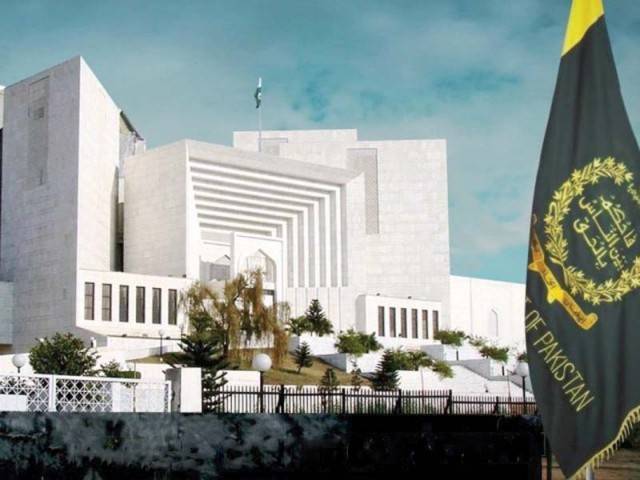ISLAMABAD - Larger bench of the Supreme Court will decide the NAB appeals challenging the IHC verdict that had suspended the sentences of deposed prime minister Nawaz Sharif and his daughter Maryam Nawaz.
The bench ordered that the defendants’ bail in the case would be maintained while the NAB plea against the matter of the suspension of the sentences would be heard separately by a larger bench.
The larger bench will also decide the legal issues pertaining to grant of bail in corruption cases. The bench will be constituted by Chief Justice Mian Saqib Nisar.
A three-judge bench headed by the chief justice and comprising Justice Mushir Alam and Justice Mazhar Alam Miankhel on Monday resumed the hearing of National Accountability Bureaus appeal against suspension of sentences of Sharifs.
Granting leave to NAB against the Islamabad High Court verdict, the bench admitted the appeal for argument and sought formulations from both parties to be considered by larger bench.
During the course of hearing, Khawaja Haris representing Nawaz Sharif contended that there were judgments on grant of bail and principle of hardship was applied in anti-terrorism case, adding that the bails have been granted in such cases.
The chief justice remarked that it is the matter of criminal procedure code. It is not the question purely of the bail but the question of suspension of sentence instead.
The defence counsel responded that it is indeed the case of suspension of sentence, adding that the sentences have been suspended even in the cases of death penalty.
He also referred different judgments authored by Justice Asif Saeed Khosa.
Keeping in view the citations of Justice Khosa’s judgment, the chief justice asked Haris if he would have any objection on Justice Khosa being member of the bench for hearing instant appeal.
On this, the counsel remained silent.
The chief justice remarked that the distrust in the judicial system must be put to an end, adding that a larger bench could also be constituted on the issues involved in the case.
Advocate Haris responded that he will have no objection on larger bench.
The chief justice remarked that he will fix the date of hearing of the matter after return from abroad.
He then directing the parties for submitting points, requiring to be considered by the larger bench, adjourned the hearing till December 12.
According to the 4-page written order, at least 18 questions have been framed to be considered by the larger bench.
The larger bench will consider the question whether a detailed order, consisting 41 pages, is permissible while dealing with the suspension of sentence.
The questions of law also include whether in a case, where there is a statutory ouster of jurisdiction of courts to grant bail pending appeal, the constitutional jurisdiction can be invoked to grant bail.
The larger bench will also hear the arguments on whether the ground of hardship can be considered while suspending the sentence in a NAB case and whether the merits of a case can be discussed and conclusive findings be given, as done in IHC verdict.
The larger bench will also consider if the scope of the constitutional jurisdiction for grant of bail during investigation, trial or release on bail by way of suspension of sentence is much wider than the scope of grant of bail under the general law, or otherwise.
“What are the parameters of tentative assessment of evidence and how can it be differentiated from the deeper appreciation of evidence particularly in cases involving grant of bail by suspending the sentence and release on bail during pendency of the appeal?”
Amendments in NAO
The top court on Monday proposed appropriate amendments in the National Accountability Ordinance (NAO) 1999.
A 22-page verdict authored by Justice Asif Saeed Khosa observed, “In the changed scenario the legislature may, if so advised, consider amending the National Accountability Ordinance, 1999 appropriately so as to enable an accused person to apply for his bail before the relevant Accountability Court in the first instance.
“It is also recommended that the unrealistic timeframe for conclusion of a trial specified in section 16(a) of the National Accountability Ordinance, 1999 may also be reconsidered and revisited by the legislature.”
Justice Khosa was part of the larger bench which decided bail appeal of an Office Superintendent in the office of the Director Development, Quetta Division, Tallat Ishaq.
It is observed that the original intent behind introduction of section 9(b) of the NAO 1999 ousting jurisdiction of the courts regarding grant of bail in a case under the said Ordinance already stands neutralized by opening of the door for bail through exercise of constitutional jurisdiction of a High Court and resultantly the entire burden in that regard is being shouldered by the High Courts which is a huge and an unnecessary drain on their precious time.
“Apart from that the High Courts and this Court have always felt difficulty in adjusting the requirements of “without lawful authority” and “of no legal effect” relevant to a writ of certiorari (Article 199(1)(a)(ii) of the Constitution) with the requirements of bail provided in section 497, Cr.P.C”
The judgment while comprehensively interpreting section 16(a) of NAO 1999 held that it is not mandatory to conclude the trial of graft cases within 30 days as it has no penal consequences.
It is also held that in an appropriate case through exercise of its jurisdiction under Article 199 of the Constitution a high court may grant bail to an accused person arrested in connection with an offence under the NAO 1999 and section 9(b) of the said Ordinance does not affect the jurisdiction of a High Court conferred upon it by the Constitution.
“The constitutional jurisdiction of a High Court is, however, an extraordinary jurisdiction meant to be exercised in extraordinary circumstances and not in run of the mill cases or as a matter of course,” observed the verdict.
SC admits NAB appeal against suspension of Sharifs’ sentences
SYED SABEEHUL HUSSNAIN






